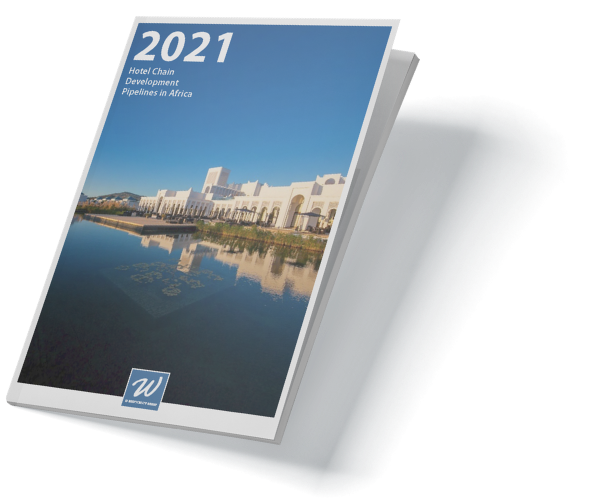Every year, W Hospitality Group works together with hotel brands and investors to compile in a report the development activity of hotel chains in Africa. Acknowledged as the most authoritative source on the growth of the hotel industry in Africa, the 13th edition of the Hotel Chain Development Pipelines in Africa report is recommended for those interested in the region.

Foreword by Trevor Ward
This is the 13th edition of our annual Hotel Chain Development Pipelines in Africa report and analysis. That number is unlucky for some, but as usual we are not dealing with luck, instead some very hard work, by the hotel brands and by the investors that they engage with, in very hard times. This report is something of a curate’s egg, parts of the news it contains are excellent, but sorry to say that, in addition, there are some bad points to convey.
We stated our belief in last year’s report that it would be inevitable that the COVID-19 pandemic, which was in the first (we thought then the only) phase of its devastation, would result in a slowdown in pipeline growth, as we got to grips with the new reality. With so many of the players locked down it looked like fewer deals could be signed, and that has proved to be the case. Whilst the crisis had a profoundly negative impact on Africa’s travel and hotel operations, the impact on deal signing was, surprisingly, much less – there were 71 deals with 10,000 rooms signed since the last study, down “only” 30 per cent on 2020.
As for the chains’ development pipelines, the total is up just over 5 per cent on last year, now standing at 447 hotels with around 82,000 rooms, which is approaching three times the number in 2009, when we first reported on the African hotel industry’s deal activity. So we’re seeing continued growth, but whilst the continued activity by the chains in expanding their footprint contributed to the increase in the pipeline, another factor was the inevitable reduction in the number of hotels opening last year. At the beginning of 2020 it was anticipated that 90 hotels with 17,000 rooms would open across Africa during the year, but in the event only just over a quarter of those opened their doors. Delays were for many reasons, all pandemic-related, including construction site closures, cargo delays, lack of finance and, for those projects which were completed, the lack of any demand in the market. Much of this was due to an unprecedented level of government regulation and legislation, which is continuing to impact on hotel development and operations.
Nevertheless, there are many reasons to be optimistic about the future. Hotel development is a long-term undertaking, and we know that there is an end to this crisis, when new hotels will be required as demand increases again. The historical growth of the chains’ presence and pipeline in Africa has been an incredibly positive story, and we are proud to be deeply involved with it – in addition to the research work carried out for this report, we have provided professional advice to several of the projects that are included in the data.
As in previous years we have quantified the recent hotel development activity in Africa at country, regional and city levels, and our detailed analyses provide useful information for investors, governments, hospitality and real estate professionals, students and other interested parties. This year we have data from 40 international and regional chains, reporting their pipeline activity for 113 of their brands for which they have signed deals in Africa.
Development activity continues to be mainly in city centres, 345 hotels of the total 447 in the pipeline, that’s 77 per cent of the deals and 71 per cent of the rooms – resorts account for nearly all of the balance (there are only 15 hotels planned at airports in the whole of Africa), 20 per cent of deals and 26 per cent of rooms. Looking at what was signed since last year’s report, fully 86 per cent of hotels and rooms are in city centre locations, and only 10 per cent in resorts. Probably that’s as much to do with the focus of the chains’ business expansion activities as it is with the desire of investors.
France-based Accor and the USA’s Marriott have for years been vying for the Number 1 slot, but this year it’s the Europeans that win, with Marriott a close second, a reverse of last year’s result. Whilst Accor has slightly fewer hotels in its development pipeline than Marriott, it has 3 per cent more rooms, because of a larger average number of keys per hotel.
Egypt once more leads the country table, with over 19,000 rooms in 67 hotels, more than double the number of rooms in second-placed Nigeria, and an amazing three times Morocco, another North African tourism power house. Equally amazing, of the 54 countries in Africa, and the 38 countries in which there are new hotels planned, almost one quarter of the pipeline rooms are in Egypt, as are almost 20 per cent of rooms under construction! Cairo, Hurghada, Sharm el Sheikh and eight other Egyptian cities and resorts have hotels under construction.
It’s because of findings like these that our annual report on hotel development activity in Africa is the most authoritative source on the growth of the hotel industry in Africa. We are delighted to have the continuing opportunity to be closely involved in the African hotel success story.
We are extremely grateful to the hotel chains who contributed to our report this year, both those stalwarts who provide their data every year, and those new to the survey in 2021. A full list of the chains included is provided in Appendix 1.
Should you have any comments and questions on the report, then please do get in touch.
Trevor J Ward
Managing Director
W Hospitality Group
Lagos, Nigeria
Link to download:
Download